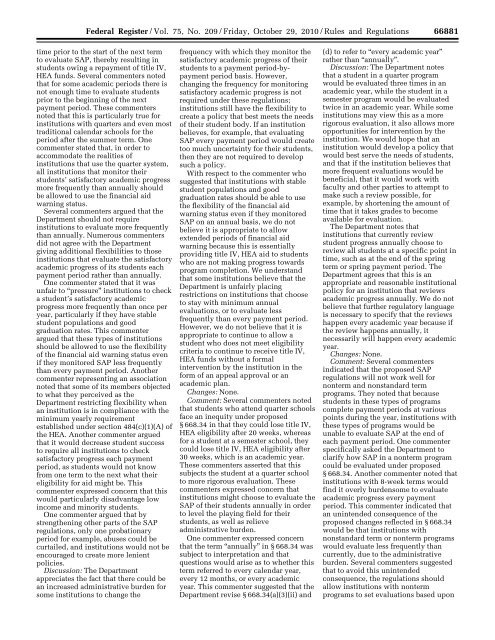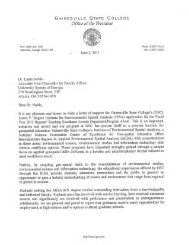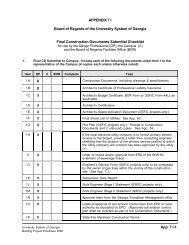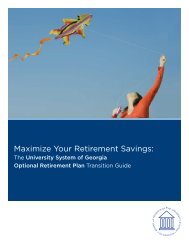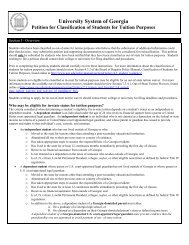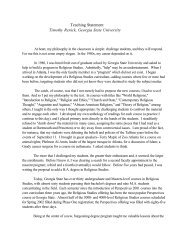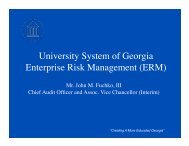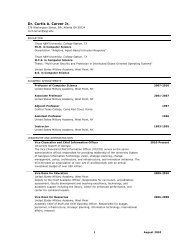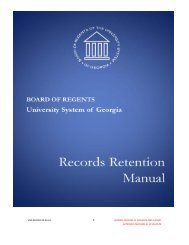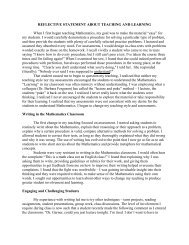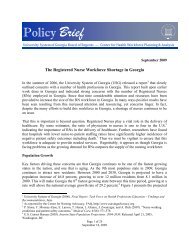66880 Federal Register / Vol. 75, No. 209 / Friday, October 29, 2010 / Rules and RegulationsWReier-Aviles on DSKGBLS3C1PROD with RULES2while still preserving program integrity.For the commenter who suggested thatthe <strong>Department</strong> should encourageinstitutions to study the consequences<strong>of</strong> their SAP policies and allowincentives for doing so, we will take thisunder advisement when we next havethe opportunity to develop experimentalsite proposals.We do not agree with the commenterswho suggest that the SAP regulationsare too prescriptive or intrusive. Section484(c)(1)(A) <strong>of</strong> the HEA requires that aneligible student be making satisfactoryprogress towards program completion,and that institutions check at leastannually for programs longer than ayear, that a student is annually meetingthat requirement. These regulations donot require institutions to do any morethan what is required by the HEA, andare not more difficult to comply withthan the current regulations. Therefore,institutions should not experienceincreased incidents <strong>of</strong> noncompliance.We will continue to provide anyapplicable and needed guidance in theFSA Handbook to assist institutions incomplying with the regulations.We do agree with the commenterswho stated that an increase in SAPmonitoring to a payment period bypayment period basis would increaseadministrative burden. However,institutions are free to continue tomonitor as frequently as they currentlydo, and are not required to change theirSAP policy and monitor every paymentperiod. As for the unintendedconsequences for particular groups <strong>of</strong>students, these regulations allow forinstitutions to craft SAP policies thatbest fit the needs <strong>of</strong> their students. Aninstitution could evaluate the needs <strong>of</strong>any special student groups and findways to work effectively with thosestudents. For example, a specificstudent may need to have assistancedeveloping an academic plan that willenable him or her to be successful.Changes: None.Delayed ImplementationComment: Several commenterssuggested that implementation <strong>of</strong> theproposed changes to §§ 668.16(e),668.32(f) and 668.34 should be delayedfor a couple <strong>of</strong> years to allowinstitutions to prepare their policies andprocedures to comply with theregulatory changes. One commenterrecommended that implementation bedelayed until the 2012–13 award year toallow for institutions to make changes totheir monitoring systems. Anothercommenter encouraged the <strong>Department</strong>to delay implementation <strong>of</strong> theregulations for SAP, but noted that if wedo not delay implementation, then the<strong>Department</strong> should issue guidance as tohow the new regulations will affectsummer crossover payment periods.This commenter expressed concern that,without this additional guidance, it willbe unclear as to which SAP regulationsapply to students enrolled in summer.Discussion: While the <strong>Department</strong>appreciates that some institutions mayhave to make changes to computermonitoring systems, or written policiesand procedures, we do not believe thatthe changes to the SAP regulations areextensive enough to warrant delayedimplementation. Institutions that mayhave to adjust or change their SAPpolicy will have to publicize such achange to students, and let studentsknow when any new SAP policy iseffective. As such, the summercrossover payment period would beaddressed by the school’s new policyand would be subject to the effectivedate <strong>of</strong> the school’s new policy. Forexample, a school may decide that forthe purpose <strong>of</strong> this policy change, a2011–12 summer crossover period willbe subject to their current SAP policyand procedures, as part <strong>of</strong> the 2010–11award year. This would be acceptable,and should be addressed in the school’snotification to their students <strong>of</strong> theeffective date <strong>of</strong> any new policy.Changes: None.Satisfactory Academic Progress(§ 668.34)Comment: Two commenters statedthat the term ‘‘financial aid applicants’’should be substituted for the word‘‘students’’ in § 668.34. The commentersindicated that students who had notapplied for financial aid would beconfused by notifications abouteligibility under the SAP regulations.These commenters argued thatinstitutions should only be required tosend notifications to financial aidapplicants, and that the proposedrequirement that notifications be sent toall <strong>of</strong> an institution’s students isunreasonable.Discussion: There is no requirementin the proposed regulations for schoolsto notify students who are not applyingor receiving title IV, HEA aid <strong>of</strong> theireligibility under SAP. These regulationsdo not impose such a requirement.Moreover, we do not believe it isnecessary to replace the term ‘‘student’’with the term ‘‘financial aid applicant’’in these regulations since we arereferring to general student eligibilitycriteria, which affect not only financialaid applicants, but recipients <strong>of</strong> title IV,HEA funds as well. There is no attemptto regulate any other students in theseregulations.Changes: None.VerDate Mar2010 14:10 Oct 28, 2010 Jkt 223001 PO 00000 Frm 00050 Fmt 4701 Sfmt 4700 E:\FR\FM\29OCR2.SGM 29OCR2Consistency Among Categories <strong>of</strong>StudentsComment: One commenter noted thatproposed § 668.34(a)(2) retained thelanguage from current § 668.16(e)(3) thatthe institution’s policy must beconsistent among categories <strong>of</strong> students.This commenter questioned whether,within the categories <strong>of</strong> students, aninstitution could evaluate sub-categories<strong>of</strong> students differently. For example,within the group <strong>of</strong> undergraduatestudents, could an institution choose toevaluate freshmen and sophomorestudents every payment period butupperclassmen only once a year. Thecommenter noted that this approachmight be used if the institutiondetermined that students in the first twoyears needed more intervention, andthat after that time students were morelikely to remain enrolled untilgraduation. The commenter also asked ifthis approach is allowable, could theinstitution use a financial aid warningfor those students who are evaluatedevery payment period.One commenter noted that proposed§ 668.34(a)(2) does not appear to allowfor different evaluation periods basedupon the type <strong>of</strong> student or programbeing evaluated. For example, thiscommenter noted that an institutionmay want to evaluate undergraduateseach payment period and evaluategraduate students annually. Thecommenter proposed changes to theregulatory language that would allow forsuch a difference.Discussion: These regulations retainthe flexibility for an institution toevaluate different categories <strong>of</strong> studentsdifferently, as long as the policyprovides for consistent application <strong>of</strong>standards within each <strong>of</strong> the categories<strong>of</strong> students. Institutions retain flexibilityto create a policy within those groups <strong>of</strong>students to best meet the needs <strong>of</strong> itsstudent body. If they wish to institute apolicy that evaluates freshmen andsophomores every payment period, andjuniors and seniors annually, aninstitution is free to do so. Such a policywould only allow for the automaticfinancial aid warning status to be usedfor those students who are evaluatedevery payment period. This would,however, allow for a policy that issensitive to the needs <strong>of</strong> the institution’sstudent body. For this reason, we do notbelieve that any changes are needed torespond to the commenters’ concerns.Changes: None.Frequency <strong>of</strong> EvaluationComment: One commenter supportedthe proposed regulations, but expressedconcern that an institution may not have
Federal Register / Vol. 75, No. 209 / Friday, October 29, 2010 / Rules and Regulations66881WReier-Aviles on DSKGBLS3C1PROD with RULES2time prior to the start <strong>of</strong> the next termto evaluate SAP, thereby resulting instudents owing a repayment <strong>of</strong> title IV,HEA funds. Several commenters notedthat for some academic periods there isnot enough time to evaluate studentsprior to the beginning <strong>of</strong> the nextpayment period. These commentersnoted that this is particularly true forinstitutions with quarters and even mosttraditional calendar schools for theperiod after the summer term. Onecommenter stated that, in order toaccommodate the realities <strong>of</strong>institutions that use the quarter system,all institutions that monitor theirstudents’ satisfactory academic progressmore frequently than annually shouldbe allowed to use the financial aidwarning status.Several commenters argued that the<strong>Department</strong> should not requireinstitutions to evaluate more frequentlythan annually. Numerous commentersdid not agree with the <strong>Department</strong>giving additional flexibilities to thoseinstitutions that evaluate the satisfactoryacademic progress <strong>of</strong> its students eachpayment period rather than annually.One commenter stated that it wasunfair to ‘‘pressure’’ institutions to checka student’s satisfactory academicprogress more frequently than once peryear, particularly if they have stablestudent populations and goodgraduation rates. This commenterargued that these types <strong>of</strong> institutionsshould be allowed to use the flexibility<strong>of</strong> the financial aid warning status evenif they monitored SAP less frequentlythan every payment period. Anothercommenter representing an associationnoted that some <strong>of</strong> its members objectedto what they perceived as the<strong>Department</strong> restricting flexibility whenan institution is in compliance with theminimum yearly requirementestablished under section 484(c)(1)(A) <strong>of</strong>the HEA. Another commenter arguedthat it would decrease student successto require all institutions to checksatisfactory progress each paymentperiod, as students would not knowfrom one term to the next what theireligibility for aid might be. Thiscommenter expressed concern that thiswould particularly disadvantage lowincome and minority students.One commenter argued that bystrengthening other parts <strong>of</strong> the SAPregulations, only one probationaryperiod for example, abuses could becurtailed, and institutions would not beencouraged to create more lenientpolicies.Discussion: The <strong>Department</strong>appreciates the fact that there could bean increased administrative burden forsome institutions to change thefrequency with which they monitor thesatisfactory academic progress <strong>of</strong> theirstudents to a payment period-bypaymentperiod basis. However,changing the frequency for monitoringsatisfactory academic progress is notrequired under these regulations;institutions still have the flexibility tocreate a policy that best meets the needs<strong>of</strong> their student body. If an institutionbelieves, for example, that evaluatingSAP every payment period would createtoo much uncertainty for their students,then they are not required to developsuch a policy.With respect to the commenter whosuggested that institutions with stablestudent populations and goodgraduation rates should be able to usethe flexibility <strong>of</strong> the financial aidwarning status even if they monitoredSAP on an annual basis, we do notbelieve it is appropriate to allowextended periods <strong>of</strong> financial aidwarning because this is essentiallyproviding title IV, HEA aid to studentswho are not making progress towardsprogram completion. We understandthat some institutions believe that the<strong>Department</strong> is unfairly placingrestrictions on institutions that chooseto stay with minimum annualevaluations, or to evaluate lessfrequently than every payment period.However, we do not believe that it isappropriate to continue to allow astudent who does not meet eligibilitycriteria to continue to receive title IV,HEA funds without a formalintervention by the institution in theform <strong>of</strong> an appeal approval or anacademic plan.Changes: None.Comment: Several commenters notedthat students who attend quarter schoolsface an inequity under proposed§ 668.34 in that they could lose title IV,HEA eligibility after 20 weeks, whereasfor a student at a semester school, theycould lose title IV, HEA eligibility after30 weeks, which is an academic year.These commenters asserted that thissubjects the student at a quarter schoolto more rigorous evaluation. Thesecommenters expressed concern thatinstitutions might choose to evaluate theSAP <strong>of</strong> their students annually in orderto level the playing field for theirstudents, as well as relieveadministrative burden.One commenter expressed concernthat the term ‘‘annually’’ in § 668.34 wassubject to interpretation and thatquestions would arise as to whether thisterm referred to every calendar year,every 12 months, or every academicyear. This commenter suggested that the<strong>Department</strong> revise § 668.34(a)(3)(ii) andVerDate Mar2010 14:10 Oct 28, 2010 Jkt 223001 PO 00000 Frm 00051 Fmt 4701 Sfmt 4700 E:\FR\FM\29OCR2.SGM 29OCR2(d) to refer to ‘‘every academic year’’rather than ‘‘annually’’.Discussion: The <strong>Department</strong> notesthat a student in a quarter programwould be evaluated three times in anacademic year, while the student in asemester program would be evaluatedtwice in an academic year. While someinstitutions may view this as a morerigorous evaluation, it also allows moreopportunities for intervention by theinstitution. We would hope that aninstitution would develop a policy thatwould best serve the needs <strong>of</strong> students,and that if the institution believes thatmore frequent evaluations would bebeneficial, that it would work withfaculty and other parties to attempt tomake such a review possible, forexample, by shortening the amount <strong>of</strong>time that it takes grades to becomeavailable for evaluation.The <strong>Department</strong> notes thatinstitutions that currently reviewstudent progress annually choose toreview all students at a specific point intime, such as at the end <strong>of</strong> the springterm or spring payment period. The<strong>Department</strong> agrees that this is anappropriate and reasonable institutionalpolicy for an institution that reviewsacademic progress annually. We do notbelieve that further regulatory languageis necessary to specify that the reviewshappen every academic year because ifthe review happens annually, itnecessarily will happen every academicyear.Changes: None.Comment: Several commentersindicated that the proposed SAPregulations will not work well fornonterm and nonstandard termprograms. They noted that becausestudents in these types <strong>of</strong> programscomplete payment periods at variouspoints during the year, institutions withthese types <strong>of</strong> programs would beunable to evaluate SAP at the end <strong>of</strong>each payment period. One commenterspecifically asked the <strong>Department</strong> toclarify how SAP in a nonterm programcould be evaluated under proposed§ 668.34. Another commenter noted thatinstitutions with 8-week terms wouldfind it overly burdensome to evaluateacademic progress every paymentperiod. This commenter indicated thatan unintended consequence <strong>of</strong> theproposed changes reflected in § 668.34would be that institutions withnonstandard term or nonterm programswould evaluate less frequently thancurrently, due to the administrativeburden. Several commenters suggestedthat to avoid this unintendedconsequence, the regulations shouldallow institutions with nontermprograms to set evaluations based upon
- Page 1 and 2: Friday,October 29, 2010Part IIDepar
- Page 3 and 4: Federal Register / Vol. 75, No. 209
- Page 6 and 7: 66836 Federal Register / Vol. 75, N
- Page 8 and 9: 66838 Federal Register / Vol. 75, N
- Page 10 and 11: WReier-Aviles on DSKGBLS3C1PROD wit
- Page 12 and 13: 66842 Federal Register / Vol. 75, N
- Page 14 and 15: 66844 Federal Register / Vol. 75, N
- Page 16 and 17: WReier-Aviles on DSKGBLS3C1PROD wit
- Page 18 and 19: 66848 Federal Register / Vol. 75, N
- Page 20 and 21: 66850 Federal Register / Vol. 75, N
- Page 22 and 23: WReier-Aviles on DSKGBLS3C1PROD wit
- Page 24 and 25: 66854 Federal Register / Vol. 75, N
- Page 26 and 27: WReier-Aviles on DSKGBLS3C1PROD wit
- Page 28 and 29: 66858 Federal Register / Vol. 75, N
- Page 30 and 31: 66860 Federal Register / Vol. 75, N
- Page 32 and 33: 66862 Federal Register / Vol. 75, N
- Page 34 and 35: 66864 Federal Register / Vol. 75, N
- Page 36 and 37: 66866 Federal Register / Vol. 75, N
- Page 38 and 39: WReier-Aviles on DSKGBLS3C1PROD wit
- Page 40 and 41: WReier-Aviles on DSKGBLS3C1PROD wit
- Page 42 and 43: 66872 Federal Register / Vol. 75, N
- Page 44 and 45: WReier-Aviles on DSKGBLS3C1PROD wit
- Page 46 and 47: WReier-Aviles on DSKGBLS3C1PROD wit
- Page 48 and 49: WReier-Aviles on DSKGBLS3C1PROD wit
- Page 52 and 53: WReier-Aviles on DSKGBLS3C1PROD wit
- Page 54 and 55: 66884 Federal Register / Vol. 75, N
- Page 56 and 57: 66886 Federal Register / Vol. 75, N
- Page 58 and 59: WReier-Aviles on DSKGBLS3C1PROD wit
- Page 60 and 61: WReier-Aviles on DSKGBLS3C1PROD wit
- Page 62 and 63: WReier-Aviles on DSKGBLS3C1PROD wit
- Page 64 and 65: WReier-Aviles on DSKGBLS3C1PROD wit
- Page 66 and 67: WReier-Aviles on DSKGBLS3C1PROD wit
- Page 68 and 69: WReier-Aviles on DSKGBLS3C1PROD wit
- Page 70 and 71: WReier-Aviles on DSKGBLS3C1PROD wit
- Page 72 and 73: 66902 Federal Register / Vol. 75, N
- Page 74 and 75: WReier-Aviles on DSKGBLS3C1PROD wit
- Page 76 and 77: WReier-Aviles on DSKGBLS3C1PROD wit
- Page 78 and 79: 66908 Federal Register / Vol. 75, N
- Page 80 and 81: WReier-Aviles on DSKGBLS3C1PROD wit
- Page 82 and 83: 66912 Federal Register / Vol. 75, N
- Page 84 and 85: WReier-Aviles on DSKGBLS3C1PROD wit
- Page 86 and 87: 66916 Federal Register / Vol. 75, N
- Page 88 and 89: WReier-Aviles on DSKGBLS3C1PROD wit
- Page 90 and 91: WReier-Aviles on DSKGBLS3C1PROD wit
- Page 92 and 93: WReier-Aviles on DSKGBLS3C1PROD wit
- Page 94 and 95: 66924 Federal Register / Vol. 75, N
- Page 96 and 97: WReier-Aviles on DSKGBLS3C1PROD wit
- Page 98 and 99: 66928 Federal Register / Vol. 75, N
- Page 100 and 101:
WReier-Aviles on DSKGBLS3C1PROD wit
- Page 102 and 103:
66932 Federal Register / Vol. 75, N
- Page 104 and 105:
WReier-Aviles on DSKGBLS3C1PROD wit
- Page 106 and 107:
66936 Federal Register / Vol. 75, N
- Page 108 and 109:
66938 Federal Register / Vol. 75, N
- Page 110 and 111:
66940 Federal Register / Vol. 75, N
- Page 112 and 113:
66942 Federal Register / Vol. 75, N
- Page 114 and 115:
66944 Federal Register / Vol. 75, N
- Page 116 and 117:
66946 Federal Register / Vol. 75, N
- Page 118 and 119:
WReier-Aviles on DSKGBLS3C1PROD wit
- Page 120 and 121:
WReier-Aviles on DSKGBLS3C1PROD wit
- Page 122 and 123:
WReier-Aviles on DSKGBLS3C1PROD wit
- Page 124 and 125:
66954 Federal Register / Vol. 75, N
- Page 126 and 127:
WReier-Aviles on DSKGBLS3C1PROD wit
- Page 128 and 129:
66958 Federal Register / Vol. 75, N
- Page 130 and 131:
66960 Federal Register / Vol. 75, N
- Page 132 and 133:
WReier-Aviles on DSKGBLS3C1PROD wit
- Page 134 and 135:
WReier-Aviles on DSKGBLS3C1PROD wit
- Page 136 and 137:
WReier-Aviles on DSKGBLS3C1PROD wit
- Page 138 and 139:
66968 Federal Register / Vol. 75, N
- Page 140 and 141:
66970 Federal Register / Vol. 75, N
- Page 142 and 143:
66972 Federal Register / Vol. 75, N
- Page 144 and 145:
66974 Federal Register / Vol. 75, N


